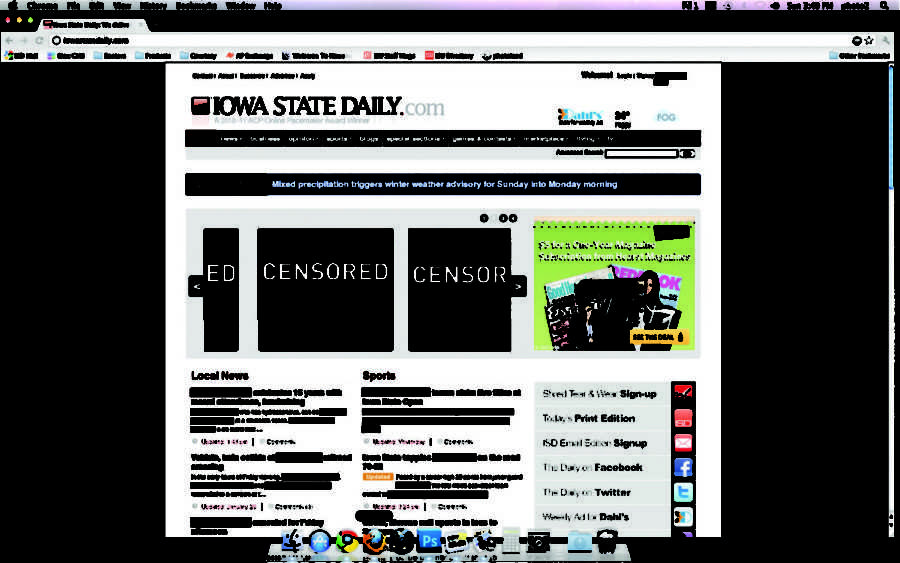Watson: Web reacts to Wikipedia ‘blackout’
Illustration: Tim Reuter/Iowa State Daily
Many websites protest the newly introduced SOPA Act, which is intended to inhibit online piracy.
January 24, 2012
Liberty and sharing vs. censorship and piracy — this is the never-ending debate of 21st-century Internet. I’m sure most of you discovered the encyclopedia-themed website Wikipedia was shut down, or blacked out, last Wednesday in protest of two anti-piracy bills, SOPA and PIPA. These bills were designed to control the pirating of entertainment and information from off-shore sites. SOPA and PIPA are being fought by millions around the world, as it stands to threaten our self-endowed right to a free Web.
The Stop Online Piracy Act and the Protect IP Act are heavily endorsed by the House of Representatives and the Senate, as well as the record companies, film studios and publishing firms. Those against the proposed bills include advocates of a free Web, such as Facebook, Twitter, Google, AOL, eBay and Yahoo. All have expressed their support of Wikipedia’s website blackout demonstration against SOPA and PIPA. This is not a pro-piracy article. SOPA and PIPA are being fought because of the liberty-restricting design of the bills, not the principles of which the bill derives.
There have been other website-restricting bills enacted by Congress, such as the Digital Millennium Copyright Act. DMCA removes specific, unauthorized content from the Internet, whereas SOPA and PIPA would remove the platforms from which the unauthorized content is posted. This would allow the American government to shut down offshore sharing sites such as Pirate Bay and MegaUpload. Many of the World Wide Web’s frequent blog users say these programs will not even work. These sites can simply change their IP address and continue their offshore pirate activities.
Meanwhile, other legitimate companies, such as Facebook, Google, YouTube and Yahoo, will feel the brunt of SOPA’s and PIPA’s overzealous legislations. Since these bills target the platforms providing the unauthorized content, if anyone posts anything infringing the copyrights of other websites, companies, etc., the host website will be fined severely or removed from the Web completely. Other sources say the bills are poorly worded, which is at the root of these outcries. The way the bills are worded has created loopholes for the “rogue” websites that could avoid any condemnation altogether.
Along with not capturing the bad guys, it puts the legitimate websites in a very compromising situation, which is responsibility for all content posted by patrons. “The standard for immunity is incredibly low and the potential for abuse is off the charts,” said the Electronic Frontier Foundation.
The copyright laws these websites are expected to follow are very strict. Perhaps you have noticed when listening to one of your favorite bands on YouTube, the songs are rarely the studio-released version. To protect themselves from a good suing, YouTube — or the poster — must change the song slightly. This poses potential problems for future websites and businesses. Along with the risk of infringement, new businesses will also need to hire lawyers and jump through many legal hoops to get off the ground.
America has built a reputation in computer and Internet innovation. These new bills would stagnate creativity, causing us to fall behind in technology and Web services. Under SOPA and PIPA, today’s top websites, such as eBay, Facebook and Yahoo, would have surely struggled to rise in popularity. Imagine waking up tomorrow, checking your phone and finding your favorite websites, which you have come to know and love, have all at once disappeared. It’s a virtual nightmare.
Thanks in large part to the vast support from the online community, discussions of rethinking SOPA and PIPA are being considered to find a more direct approach to solving the pirate problem. There are talks of revamping SOPA and PIPA, but there are better options that can appease everybody.
With the exception of the pirates, there is an alternative act that may please everyone. It is called the OPEN Act. This bill differs from SOPA and PIPA by shutting down the platform on which the copyright infringing data starts. The bill instead shuts off the ads and search engine hits, known as the “financial transaction providers,” which fund the original website. This would eliminate the funds that keep the offshore pirate sites operating, starving them to death and forcing the site down. This approach preserves the sanctity of an uncensored Web and targets the attack on the “rogue” sites.
The Internet is a relatively new frontier, and we are still learning how to make it a fair place for all. As long as we continue to strive for what is just and don’t accept censorship for the sake of convenience, we will continue to travel to unimaginable heights.







